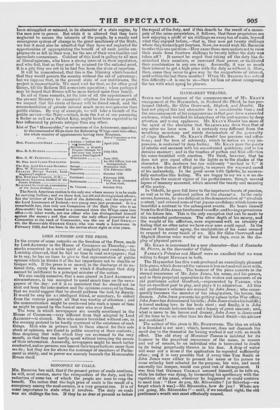HAYMARKET THEATRE.
SINCE our brief account of the commencement of Mr. KEAN'S engagement at the Haymarket, in Richard the Third, he has per- formed Othello, Sir Giles Overreach, Shylock, and Hamlet. He had not played this last character for a considerable time ; and the announcement of his reappearance in that part drew a crowded audience, which testified its admiration of the performance by deep attention and warm appla.uses. Mr. KE AN'S Hamlet has more of the spirit of the character that SHAKSPEARE drew than that of any actor we have seen. It is certainly very different from the mouthing monotony and stately declamation of the generality of stage -Hamlets. Mr. KEAN'S Hamlet has passions and affec- tions; and the tone of solemnity, which he makes so very im- pressive, is sustained by deep feeling.. Mr. KERN gave the points of rebuke and sarcasm with his accustomed quickness, and in his decisive manner ; and in the touches of pathos and filial affection his voice trembled with emotion. We think, however, that he does not give equal effect to the lights as to the shades of the character. His madness has too uniformly "method in 't:" it wants a few dashes of fitful gaiety, to express the wayward mood of his melancholy. In the great scene with Ophelia, he success- fully embodies this feeling. We are happy to say we saw no de- cline from the ancient vigour of his performance, though several, lapses of memory occurred, which marred the beauty and meaning of the poetry. In Othello, he gave full force to the impetuous bursts of passion, as well as to the profound pathos of the character. In the early scenes, however, he was deficient in the demonstration of "absolute content," and evinced none of that joyous confidence which forms so. beautiful a contrast to the subsequent events. He bears himself from the first like a m an foredoomed to suffer, and having a preseience of his future fate. This is the only exception that can be made to this wonderful performance. The utter depth of his misery, and the weight of his affliction, were expressed with an intensity of feeling that no other actor we have ever seen could equal. In the throes of his mental agony, the modulations of his voice seemed' to respond to every touch of wo. His Sir Giles Overreach and Shylock likewise were worthy of his best days, even in the dis- play of physical power.
Mr. KEAN is announced for a new character—that of Eustache St. Pierre, in the Surrender of Calais.
FARREN'S Polonius and Marall were so excellent that we were willing to forget MUNDEN in both.
The Haymarket has this week produced an exceedingly pleasant little piece, which deserved the success it has met and will meet with..
It is called John Jones. The humour of the piece consists in the eternal recurrence of Mr. John Jones, his name, and his person, and in their perpetual opposition to the wishes and measures of an old gentleman called Goodluck,—represented by FAnRsN, who has an excellent part to play, and plays it to admiration. All this old gentleman's schemes are crossed by John Jones; who conse- quently becomes the monster of his imagination, his horror, his. daemon. John Jones prevents his getting aplace in the War-office; John Jones has dishonoured his bills ; John Jones eludes his bailiffs ; is found making love to his bride elect ; and finally, it is John Jones who stands between him and a legacy of great amount; and,. what is more to his horror and dismay, John Jones is discovered all the time to be no other than his dear friend Smith—his adviser and confidant !
The author of this piece is Mr. BUCKSTONE. The idea on which it is founded is not clew; which, however, does not diminish the
merit due to the dramatist for having worked it out with so much effect. The old story of Monsieur Tonson is indebted for its humour to the perpetual recurrence of the name, in season and out of season, to an individual who is tormented to death by its being perpetually thrown in his face. A drop of water will wear out a stone if the application be repeated sufficiently
often ; anit it is very possible that if every time Tom Smith or John Jones were either to present his name or his person to some unlucky butt selected for the purpose, his wits, and most assuredly his temper, would run great risk of derangement. It was thus that GEORGE Coractiv amused himself, as he tells us,
while his father was dying, by tormenting his apothecary with the- repetition of his name, whenever he happened or could contrive to meet him : " How do you, Mr. Silversides ? [or Silvertop—we forget which it was]—Mr. Silversides, how do you? Where are you going, Mr. Silversides ?"—until, if we recollect right, the' old:- gentleman's wrath was most effectually roused.


























 Previous page
Previous page